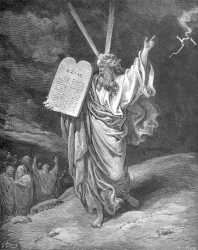Ten Commandments
The ten laws that God gave to Moses during his visits to Mount Sinai. They are found in Exodus 20:2-17 and in Deuteronomy 5:7-21.
On Moses' first visit, about fifty days after they came out of Egypt, he received the commandments from God and communicated them orally to the people.1 When Moses returned to Mount Sinai, God Himself inscribed them on two stone tablets, which Moses later destroyed in anger when his people had abandoned their faith.2 God later commanded him to hew two new tablets on which He wrote the words that were on the first tablets.3 These tables were afterwards placed in the ark of the covenant.4 Their subsequent history is unknown. They are as a whole called "the covenant,"5 and "the tables of the covenant,"6 and "the testimony."
The commandments are:
- I am the Lord thy God, who brought thee out of the land of Egypt, out of the house of slavery (prologue).
- Thou shalt have no other gods before Me. Thou shalt not make unto thee a graven image, nor any manner of likeness, of any thing that is in heaven above, or that is in the earth beneath, or that is in the water under the earth; Thou shalt not bow down unto them, nor serve them; for I the Lord thy God am a jealous God, visiting the iniquity of the fathers upon the children unto the third and fourth generation of them that hate Me; And showing mercy unto the thousandth generation of them that love Me and keep My commandments.
- Thou shalt not take the name of the Lord thy God in vain; for the Lord will not hold him guiltless that taketh His name in vain.
- Remember the Sabbath day to keep it holy. Six days shalt thou labor, and do all thy work. But the seventh day is the Sabbath in honor of the Lord thy God; on it thou shalt not do any work, neither thou, nor thy son, nor thy daughter, thy manservant nor thy maidservant, nor thy cattle, nor thy stranger that is within thy gates; For in six days the Lord made the heavens and the earth, the sea, and all that is in them, and rested on the seventh day; therefore the Lord blessed the Sabbath day, and hallowed it.
- Honor thy father and thy mother; in order that thy days may be prolonged upon the land which the Lord thy God giveth thee.
- Thou shalt not kill.
- Thou shalt not commit adultery.
- Thou shalt not steal.
- Thou shalt not bear false witness against thy neighbor.
- Thou shalt not covet thy neighbor's house; thou shalt not covet thy neighbor's wife, nor his manservant, nor his maidservant, nor his ox, nor his ass, nor any thing that is thy neighbor's.
In the Protestant and Orthodox Christian traditions, 1 and 2 are combined as the first commandment, and prohibition of idolatry is the second commandment. Roman Catholics and Lutherans follow the division made by Saint Augustine in the fourth century. It combines the prologue and the first two prohibitions (2 and 3) and divides the tenth prohibition into two separate ones (the prohibition of coveting the neighbor's wife and the prohibition of coveting the neighbor's goods).
❧
References
Notes
Sources
- Holy Bible (King James Version). 1979. Nashville: Holman Bible Publisher.
- Easton, M.G. (1897). Easton's Bible Dictionary. New York: Harper & Brothers.
